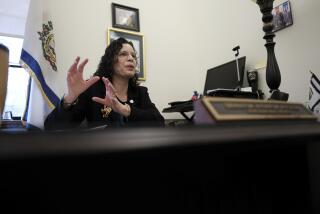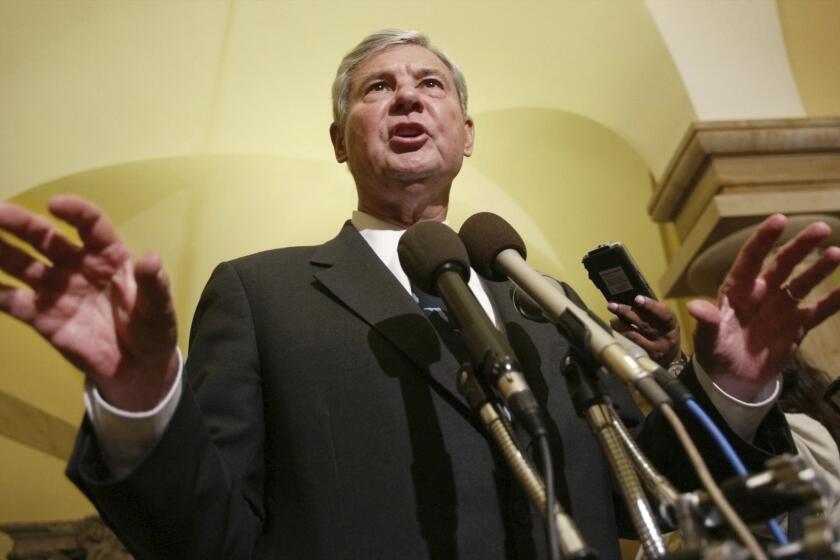PAC Paranoia: Congress Faces Campaign Spending : Politics: Hysteria was the operative word when legislators realized they could not return home without tougher campaign finance laws.
A veteran Democratic aide explained recently why senators were so eager to pass legislation tightening federal campaign-finance laws. “Everyone is hysterical,” the Senate staffer said. “They want to pass a bill. No matter what is in it.”
Hysteria, however carefully concealed, aptly characterizes how members of Congress from both parties have recently handled a host of problems related to an increasingly toxic and controversial mix: Setting and enforcing rules on the connection between money and politics.
The frantic haste by both the Senate and House to pass campaign-finance bills in the final days and hours before they began their August recess gave the best evidence of the volatile financial-political brew. On display were both the politicians’ continuing fears of the problem, real or perceived, of special-interest money and their unwillingness to make the fundamental changes required to reduce the influence.
In the current political climate, many lawmakers feared going home without being able to tell their constituents that they had confronted the special-interest groups. But they were wary of causing self-inflicted wounds by cutting off the sources of campaign money on which they have become so dependent.
The Senate Democrats’ plan passed, 59-40, over the objection of all but five Republicans, after months of back-room negotiations. It would impose voluntary spending limits pegged to a state’s population, give reduced broadcast and mail rates as incentives to candidates who agree to abide by the limits and ban contributions from political-action committees (PACs). The level of hypocrisy matched the hysteria. The Senate Democrats’ agreement to the PAC ban and a reduction from $1,000 to $250 in the ceiling on campaign gifts from out-of-state contributors triggered strong objections from agitated party insiders. These monetary sources, have been far more important to Democrats than to Republican candidates, who raise more of their funds in smaller amounts by mail.
GOP senators, for their part, said that they opposed the Democratic demand for spending limits. That change, they said, would benefit incumbent senators, most of whom are Democrats, and would be detrimental to lesser-known challengers who must spend more money to spread their message. But the Republican claim sidesteps the fact that because nearly all incumbents raise far more than do their challengers, a spending limit could help to level the playing field.
Although House Democrats also included a spending limit, their package differed significantly from that of their Senate brethren. The House bill preserved PACs, setting a $275,000 ceiling on the total that a candidate could raise from them. That limit exceeds the amount that more than 300 House members raised from special-interest groups in 1988. The House bill also failed to restrict large, out-of-state contributions which, according to campaign-finance experts, are more likely to be given in exchange for influence-peddling. The most egregious aspect of the House charade came when a more sweeping Democratic version initially passed on a voice vote, partly with the help of silent Republicans who opposed the stiffer version. Embarrassed Democrats quickly regrouped and defeated the “good-government” version, 122-128; 158 members, mostly Republicans, voted “present” to protest each version.
In both the House and Senate, members were willing to pursue the partisan imperative because they were confident Bush would fulfill his promise to veto a campaign-finance bill with spending limits.
A week before the Senate passed the campaign-finance bill, it voted to denounce Sen. Dave Durenberger (R-Minn.) for violating Senate rules limiting outside income and restricting the use of a home-state condominium. Although the vote was 96-0, the debate prompted heated exchanges on the standards for proper financial behavior.
Several senators nearly jumped down each other’s throat as they discussed the committee’s investigatory procedures in the Durenberger case. “I was not present during the public hearing but I watched it on TV,” said Sen. Don Nickles (R-Okla.) “I did not really see a special counsel (in charge of the investigation.) I saw a prosecutor. And it bothered me.” Sen. Warren Rudman (R-N.H.) heatedly responded on behalf of the Ethics Committee: “It is offensive to me personally to have Robert Bennett (the special counsel) referred to that way.”
Paying rapt attention, though not participating, on the Senate floor were the “Keating Five,” the senators--including Alan Cranston (D-Calif.)--accused of seeking regulatory favors in exchange for campaign funds from Charles H. Keating Jr., the discredited and bankrupt savings-and-loan boss. The Ethics Committee may issue preliminary rulings in their case next month.
Most senators have little to say publicly about the Keating case. But they are well aware of the potentially damaging impact on the senators under investigation. Like Durenberger, none of the five face reelection this November and they are attempting to carry on with business as usual.
A mood of hysteria also has increasingly surrounded the onset of this November’s election. Many lawmakers, Democrats and Republicans, have been edgy lately as they prepare for a fall campaign in which “incumbent” may be a nine-letter political synonym for “scum.”
Politicians have abundant financial problems to answer for in this fall’s campaign: the catastrophic S&L; mess; the federal deficit and, lest we forget, the 25% pay raise that House members voted themselves last fall after rejecting a 50% boost.
In each case, members of Congress understand that they have been part of an institutional failure to respond to real problems. In the past, most of them have been able to keep their distance, as individuals, from these hot wires. The difference in 1990 may be that voters are demanding accountability and seeking culprits.
Pollsters from both parties have found a drop of roughly 10%, when they ask voters whether they are inclined to reelect incumbents. Most lawmakers will survive this year if only because few face opponents who are even semi-credible or have adequate financing. But both parties are gearing up for surprise election setbacks.
This atmosphere helps to explain why one of the most popular political activities these days is the lineup of nervous incumbents, in a modern-day act of expatiation, returning their contributions from savings-and-loan executives. Whether their new-found purity removes their earlier sins will be up to the voters.
More to Read
Get the L.A. Times Politics newsletter
Deeply reported insights into legislation, politics and policy from Sacramento, Washington and beyond. In your inbox three times per week.
You may occasionally receive promotional content from the Los Angeles Times.






